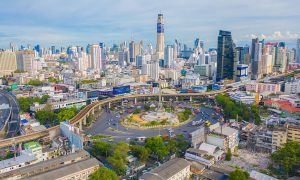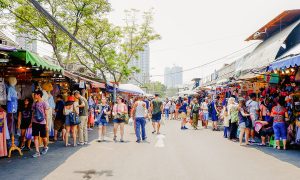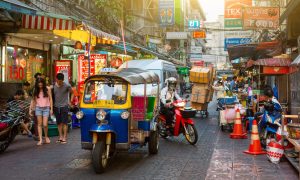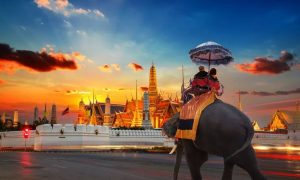As more and more people choose to move to Southeast Asia, theThailand Immigrationand Malaysiabecame two popular destinations. They both boastPleasant climate, lower cost of living, friendly expatriate policiesand is suitable for different types ofimmigrantsPeople. So which is better to settle and grow in, Thailand or Malaysia? This article will look at theImmigration policy, cost of living, real estate investment, tax policy, medical standards, employment and business opportunitiesDetailed comparisons in several dimensions, such as to help you find the most suitable immigration destination for you.
I. Comparison of immigration policies: Thailand vs Malaysia
✅ Thailand Immigrant Visaoption
- Pensioner visa (O visa, O-A visa): For applicants over 50 years of age, annual renewal is required with a800,000 bahtSavings or 65,000 baht per month retirement income.
- Thailand Elite Visa (Thailand Elite Visa):: 10-20 years of permanent residence.Fees from 600,000 baht(about 120,000 RMB).
- investment immigration(BOI investment visa): Requires investment in a Thai business or real estate and is more difficult to apply for.
- Work Visa (B Visa): Thai company sponsorship is required, but work visas are more strictly regulated.
✅ Malaysia Immigrant Visaoption
- Malaysia Second Home Program (MM2H): Requirement of RM500,000 deposit (approx. Rs. 750,000), monthly income of RM10,000 and offer of long term residency.
- S-MM2H (Sarawak Second Home): Low deposit requirement of RM150,000, suitable for small and medium investors and retirees.
- Malaysian Technology Executive Program (MTEP): Attracting talent in IT, AI and other tech fields with no deposit required.
- Malaysiainvestment immigration(D visa): Investment in a local business or property is required and the threshold is generally high.
📌 Comparative conclusions::
✅ If retiredMalaysia's MM2H program is more flexible than Thailand's pension visa and has no mandatory health insurance requirement.
✅ If an entrepreneur or high income earnerThe Elite Visa in Thailand makes it easier to pay a one-time fee for a long-term stay.
✅ If it's a tech talent, Malaysia's tech talent visa is more attractive than Thailand's.
II. Cost of Living Comparison: Thailand vs Malaysia
| Cost category | Thailand (Bangkok) | Malaysia (Kuala Lumpur) |
|---|---|---|
| rent an apartment(City Center Apartments) | 10,000-25,000 baht | RM2,000 - RM5,000 |
| gastronomy(General restaurant) | 50-200 baht/meal | RM10-40/meal |
| transportation(Metro/bus) | 1,000-3,000 baht/month | RM150-300/month |
| Utilities + Internet | 2,500-5,000 baht/month | RM300-700/month |
📌 Comparative conclusions::
✅ Lower cost of living in ThailandThe lower price of rental housing, in particular, is suitable for immigrants on a limited budget.
✅ Higher quality of life in MalaysiaThe cost of living, however, is slightly higher, especially in terms of upscale apartments and private healthcare.
Property Investment Comparison: Thailand vs Malaysia
🔹 Thailand Home Buying Policy
- Foreigners can buy apartments (freehold), but not to purchase land.
- Housing prices are relatively stable, with Bangkok, Chiang Mai and Phuket being popular places to invest.
- You can apply for long-term residency after purchasing a home, but you will not be granted permanent residency directly.
🔹 Malaysia Property Buying Policy
- Foreigners may purchase property subject toMinimum house price threshold(Requirements vary from state to state, generally RM500,000)
- You can apply for a MM2H visa by purchasing a home.It is more advantageous to stay for a long period of time.
- Kuala Lumpur, Penang and Johor are the most popular investment destinations for expatriates.
📌 Comparative conclusions::
✅ Thailand's low property prices make it suitable for short-term investment and rental incomeThe
✅ Buying a home in Malaysia makes it easier to obtain long-term residency and is more suitable for long-term settlersThe
IV. Comparison of medical standards: Thailand vs Malaysia
| medical category | Thailand (Bangkok) | Malaysia (Kuala Lumpur) |
|---|---|---|
| Public hospitals | Low cost, long queues | Low cost and high level of medical care |
| Private hospitals | Many international hospitals with moderate costs | Many international hospitals and a well-developed healthcare system |
| medical insurance | Private medical insurance required | Possibility of joining the public health system or private insurance |
📌 Comparative conclusions::
✅ Thailand's medical care is ranked first in Southeast Asia, and the private hospitals in Bangkok and Phuket are of a very high standard.The
✅ Malaysia's healthcare costs are cheaper and the healthcare system is stable, making it suitable for long-term pensioners.The
V. Tax Policy Comparison: Thailand vs Malaysia
| tax types | Thailand | Malaysia |
|---|---|---|
| personal income tax | 0%-35% | 0%-30% |
| corporate income tax | 20% | 24% |
| property tax | Transfer Tax 2%-3% | 6% (foreigners purchasing homes) |
| Overseas income tax | No tax (part of income taxable from 2024) | untaxable |
📌 Comparative conclusions::
✅ Malaysia's complete tax exemption on overseas income, more suitable for global asset planners.
✅ Thailand's low corporate tax rate for entrepreneurs and investorsThe

VI. Comparison of Employment and Entrepreneurship Opportunities: Thailand vs Malaysia
| category | Thailand | Malaysia |
|---|---|---|
| technology sector | Developing with lower start-up costs | Faster development, MTEP visas support tech talent |
| service industry | Difficult for foreigners to enter | Well-developed manufacturing sector with more job opportunities |
| Internet/telework | Suitable for digital nomads with low visa requirements | Suitable for long term settlement and friendly tax policy |
📌 Comparative conclusions::
✅ Malaysia is suitable for employment in traditional industries such as technology and manufacturingThe
✅ Thailand is better for digital nomads, remote workers and entrepreneursThe

VII. Final Verdict: Thailand vs Malaysia, which is better for you?
Suitable for the Thai crowd:
✔ Limited budget, want to live low-cost
✔ Remote workers, digital nomads
✔ Short-term pensioners
Suitable for the Malaysian crowd:
✔ People who want to obtain long-term residence
✔ Technology industry, manufacturing practitioners
✔ Plan to invest in real estate and asset planning for the long term






